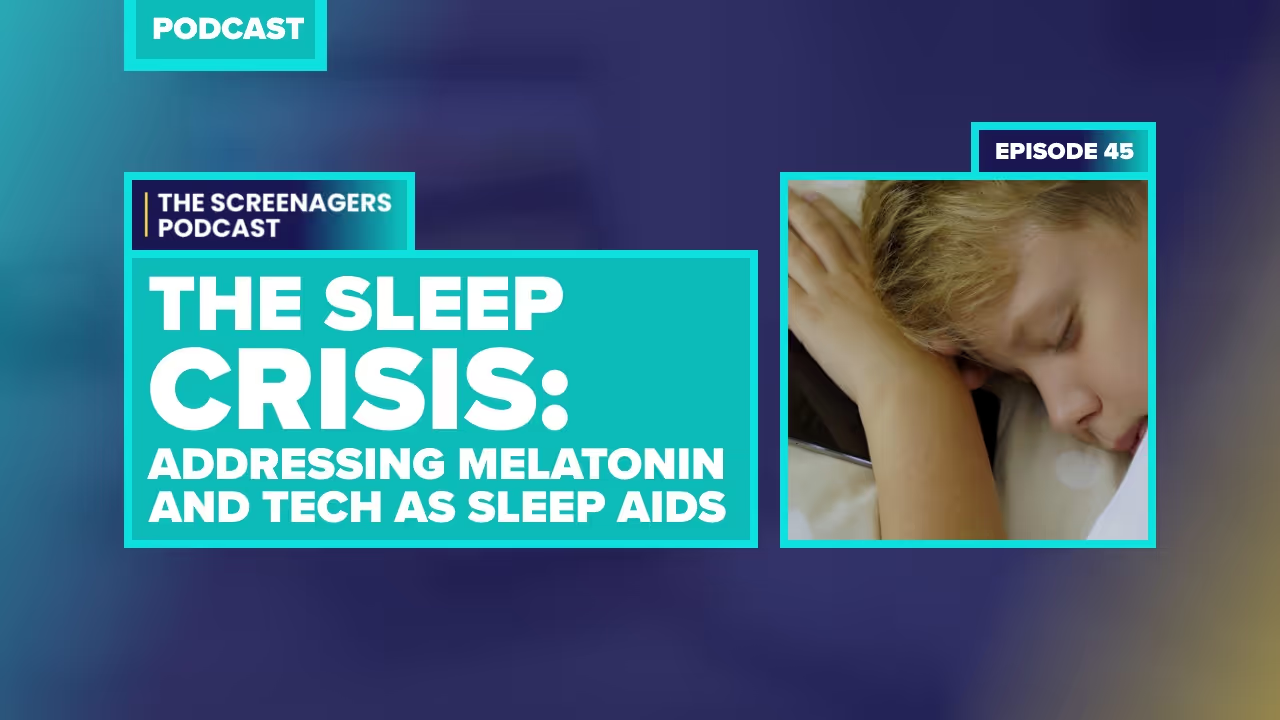
In this episode of the Screenagers podcast, Dr. Delaney explores the alarming rise of sleep deprivation among teens starting in 2012, coinciding with the rise of screen time. Featuring clips from Screenagers: Elementary School Age Edition and insights from experts Lauren Hale, PhD, and Judith Owens, MD, the episode delves into new brain science around kids and sleep deprivation and health risks linked to melatonin. Listeners are provided practical advice on how to promote healthy sleep habits, including preventing dependency to digital devices and melatonin.
Featured Expert
Research References
Study #1
“Researchers followed nine and ten year olds, and at baseline, they collected data from the kids, from the parents, and analyzed brain skins. Then they followed up with them two years later. The kids, who were insufficient sleepers Compared to the kids who were sufficient sleepers, had changes in their brain development, especially in areas like the basal ganglia and the temporal lobe.
And this corresponded with worse mental health outcomes, worse behavioral outcomes, and measurements of intelligence were lower. This is concerning that insufficient sleep among kids may have lasting consequences. Um, brain development, and possibly into adulthood.”
Study #2
“My team and I analyzed numerous studies in which we included youth age 6 to 17.
And we showed that just having a mobile device, which includes a phone, a tablet, In the bedroom, even if they didn't use it, was associated with almost a two fold risk of insufficient sleep duration.”
Judy Owen, M.D.
Bio: https://www.childrenshospital.org/directory/judith-owens
Study #1
"Recent study... over 500 percent increase in accidental ingestions of melatonin... poison control center reports of a child accidentally taking melatonin."
Study #2
"...study that was published out of Canada a few years ago that looked at a wide range of preparations of melatonin that were labeled as being five milligrams. And they... analyzed, with a specific chemical test, how much melatonin these preparations actually contained. It ranged from zero milligrams to 20 milligrams. And in addition to that, about a quarter of the samples they tested had serotonin... Serotonin is what we call a precursor of melatonin. So serotonin is metabolized into melatonin."
Study #3
"We know that melatonin... has an effect on reproductive hormones... There may be some impact on pubertal development of melatonin. Melatonin in humans could potentially have two different effects. It could delay the onset or the beginning of puberty development because it has these suppressing effects on reproductive hormones, or alternatively, if you stop melatonin use in a prepubertal child... you could actually trigger them into early puberty... We have data in animal models that suggests that melatonin has these effects. We don't have that evidence yet in humans... One study looked very short term on the effects of melatonin in children with autism and measured their reproductive hormones as well as some other chemicals in the body and brain and did not find any effect in the short term, but again, the long term meaning of melatonin... years worth of use of melatonin."
Additional Resources
Bring Screenagers to Your Community
Time Codes
00:00 Introduction to Screenagers Podcast
00:29 The Sleep Deprivation Epidemic
02:08 Scientific Insights on Sleep and Brain Health
03:47 Impact of Devices on Sleep
06:23 The Melatonin Debate
08:33 Melatonin Usage and Risks
12:49 Melatonin and Puberty
14:00 Concerns About Long-Term Melatonin Use in Children
14:43 Marketing Melatonin as a Natural Sleep Aid
15:36 The Dangers of Conditioning Kids to Need Sleep Aids
18:03 Parental Strategies for Managing Device Use
19:28 Real-Life Examples of Device Management
21:19 Encouraging Better Sleep Habits in Teens
23:14 Final Thoughts on Melatonin and Sleep Dependency
25:11 Conclusion and Podcast Information
Whether it is about a specific episode, a related topic or anything else, Dr. Ruston and the Screenagers Team would love to hear from you.
Record your question here and Dr. Ruston will try to answer them in upcoming Podcast episodes.